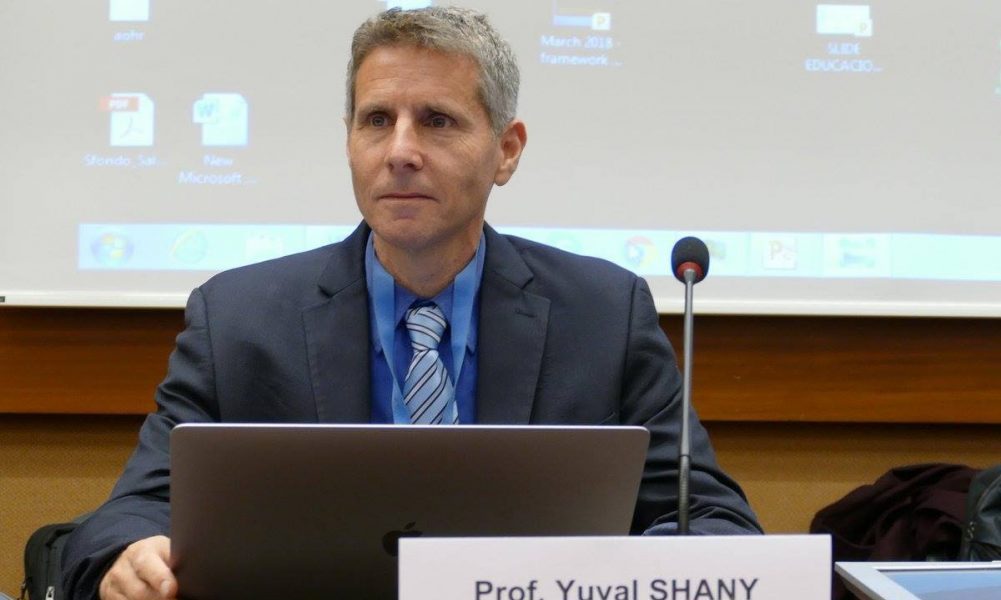Jewish News meets… UN Human Rights Committee chair – Yuval Shany
Stephen Oryszczuk speaks to the Israeli professor with a key position at the United Nations
The Israeli professor newly-elected to chair the UN Human Rights Committee has said the new Jewish Nation State Bill could add to the UN’s concerns about civil and political rights in Israel, but that the state should at least get a fair hearing.
Speaking to Jewish News from Geneva, international law expert Yuval Shany said he had just finished hearing representations from Bahrain, Algeria, Laos, Liberia, Gambia and Lithuania, but would recuse himself when it came to Israel in 2020.
The committee he was elected to lead earlier this month is not the same as the UN Human Rights Council, from which the US withdrew earlier this year citing “chronic bias” against Israel. Instead, it monitors states’ adherence to the International Covenant on Civil and Political Rights (ICCPR), a multilateral treaty with 171 state signatories, including Israel. Shany is the first Israeli to be elected to lead it.
Get The Jewish News Daily Edition by email and never miss our top stories Free Sign Up
A senior researcher at the Israel Democracy Institute and lecturer at Hebrew University, Shany has been on the committee since 2013 and says the ICCPR commits signatories to uphold civil and political rights of citizens, including the right to life, freedom of religion, freedom of speech and freedom of assembly.
States’ representatives appear before the committee every few years to report on how they are implementing these rights, and the last time Israel reported was in October 2014, just weeks after the ceasefire in Gaza, a territory in which it is required to apply the Covenant.
The committee pressed Israel on “the extra-territorial application of the Covenant to Gaza and the West Bank, the military blockade of Gaza, settlement policy, the prohibition of torture and reports of excessive use of force by authorities”.
It also reported that experts had alleged that “Israel gave first-class rights and benefits to Jewish Israeli citizens but treated others as second-class citizens,” before noting further concerns such as “provisions for the Bedouin people, returns of asylum seekers, juvenile justice, gender equality, access to water, punitive housing demolitions, the use of administrative detention and the teaching of the Holocaust”.
While he is clear that he will not participate in Israel’s next review, Shany said the committee’s concerns over first and second-class citizens would be raised again, given the Israeli parliament’s passing of the Nation State Bill this month, which among other things demotes Arabic as an official language.

Israel’s supporters in the Diaspora, including the Anti-Defamation League and the Board of Deputies, have all voiced concerns that it could lead to discrimination against Israel’s sizeable non-Jewish minority.
“It’s going to be addressed, no doubt about it,” Shany said. “It raises concerns around different rights to different citizens based on their group affiliation. This new Bill is part of the same dynamic. It introduces a new set of issues. It adds to the concerns.”
At least his committee appears to have ears for the good as well as the bad. Its 2014 report highlighted positives from Israel, such as increased rights for people with disabilities, and while Shany said he had no wish to prejudge the next review, he acknowledged that there were areas in which recent developments have been positive.
“I’m not speaking as a committee member, but there have been important movements, for instance on the funding for Arab municipalities, which channelled considerable resources to close the equality gap between Israeli and Arab municipalities in areas such as housing, education, environment and employment,” he said.
“So yes, there have been positives, and I don’t think the picture will be all negative. I imagine the committee will take note of these, as they did last time.”
Israel’s record of implementing the committee’s recommendations was “mixed,” he said. “It could be that people at a professional level would like to advance them, but at a political level it could be difficult.
“So I think Israel will present to the committee a record of partial implementation, certainly not full implementation.”
Asked whether ‘human rights’ is a dirty word in Israel, he says: “It’s a loaded word. Unfortunately, it has become associated with certain positions on the political spectrum, leftist positions, but it really shouldn’t be viewed as such.”
He adds: “I’m worried about this. I see human rights as transcending political positions. There is a very strong history of people on the right of Israeli politics taking strong positions on human rights issues. It is a shame that this is no longer perceived as the case.”
He goes on: “Some human rights organisations that deal with the Israeli-Palestinian conflict are being labelled ‘leftist’. This is being exploited by politicians and in the way they are seen in the public.
“This is very disconcerting, because human rights groups in Israel represent people from all sides of the political spectrum, without distinction, on the basis of the universality of human rights principles.”
That phenomenon, at least, shows no sign of ending. “In the past, we had Likud-led government coalitions with centrist components, but this government is more homogenous in its political orientation,” he says. “Maybe that facilitates this push-back against those groups that are perceived as opposition groups.”
Listen to this week’s episode of The Jewish Views Podcast here:

Thank you for helping to make Jewish News the leading source of news and opinion for the UK Jewish community. Today we're asking for your invaluable help to continue putting our community first in everything we do.
For as little as £5 a month you can help sustain the vital work we do in celebrating and standing up for Jewish life in Britain.
Jewish News holds our community together and keeps us connected. Like a synagogue, it’s where people turn to feel part of something bigger. It also proudly shows the rest of Britain the vibrancy and rich culture of modern Jewish life.
You can make a quick and easy one-off or monthly contribution of £5, £10, £20 or any other sum you’re comfortable with.
100% of your donation will help us continue celebrating our community, in all its dynamic diversity...
Engaging
Being a community platform means so much more than producing a newspaper and website. One of our proudest roles is media partnering with our invaluable charities to amplify the outstanding work they do to help us all.
Celebrating
There’s no shortage of oys in the world but Jewish News takes every opportunity to celebrate the joys too, through projects like Night of Heroes, 40 Under 40 and other compelling countdowns that make the community kvell with pride.
Pioneering
In the first collaboration between media outlets from different faiths, Jewish News worked with British Muslim TV and Church Times to produce a list of young activists leading the way on interfaith understanding.
Campaigning
Royal Mail issued a stamp honouring Holocaust hero Sir Nicholas Winton after a Jewish News campaign attracted more than 100,000 backers. Jewish Newsalso produces special editions of the paper highlighting pressing issues including mental health and Holocaust remembrance.
Easy access
In an age when news is readily accessible, Jewish News provides high-quality content free online and offline, removing any financial barriers to connecting people.
Voice of our community to wider society
The Jewish News team regularly appears on TV, radio and on the pages of the national press to comment on stories about the Jewish community. Easy access to the paper on the streets of London also means Jewish News provides an invaluable window into the community for the country at large.
We hope you agree all this is worth preserving.
-
By Laurent Vaughan - Senior Associate (Bishop & Sewell Solicitors)
-
By Laurent Vaughan - Senior Associate (Bishop & Sewell Solicitors)
-
By Laurent Vaughan - Senior Associate (Bishop & Sewell Solicitors)
-
By Laurent Vaughan - Senior Associate (Bishop & Sewell Solicitors)























